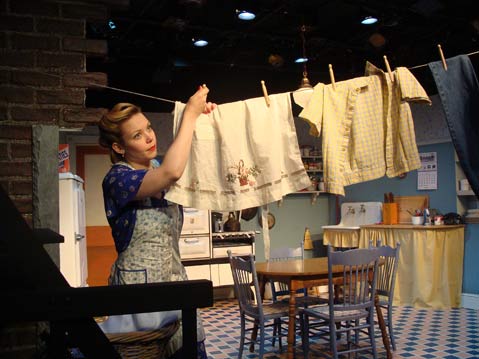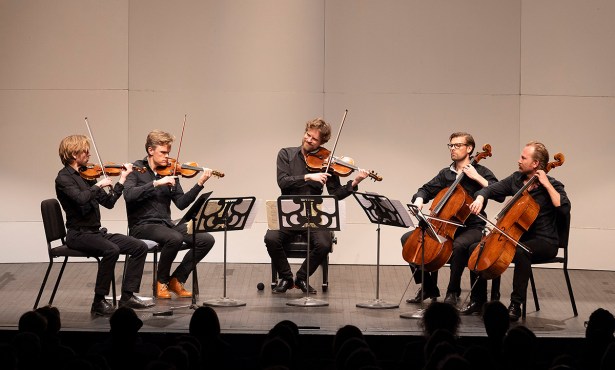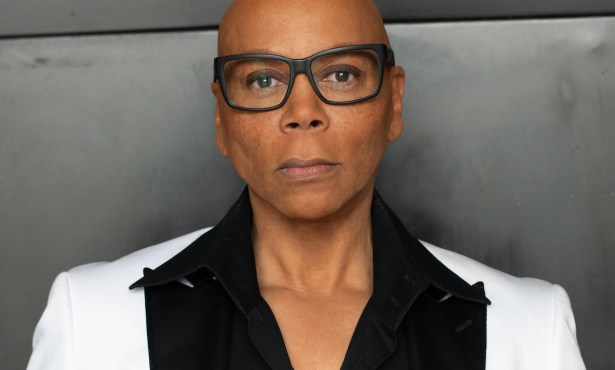The Housewives of Mannheim at ETC
Alan Brody’s Play About Women on the Home Front Opens Ensemble Season

A woman begins to grasp that society has imposed certain arbitrary limits on her choices. Curious and excited, she begins to question the assumptions she has always lived by, opening herself to a world of previously unimagined possibilities.
Sounds like a story set in the 1960s, doesn’t it? Well, guess again: Alan Brody’s The Housewives of Mannheim, which begins tonight and opens the Ensemble Theatre Company season, takes place in 1944.
It was an era when many women—including the residents of the Brooklyn apartment building where the play is set—were separated from their husbands, who were fighting overseas in World War II. This was unquestionably a hardship, but for some, it was also liberating.
“There’s always a tension between who we are and who the culture tells us we should be,” playwright Alan Brody noted in a recent interview. “These were women who wore girdles. They wore makeup to go shopping. The sense that they’re trapped in their time says something about how we’re trapped in our time now, and how we may get beyond that.”
The comedy-drama premiered at the New Jersey Repertory Company in 2009, before moving to an off-Broadway New York City theater for a limited run. The Ensemble production will be staged by the original director, SuzAnne Barabas, and feature the four actresses who created their roles.
“I grew up in an apartment building in Brooklyn, and these women all spoke to me,” said Barabas. “I grew up with women like them. I can remember that if my mother heard a door open in the hallway, she would be out in the hall—and so would everybody else. They’d always been chatting and gossiping. Everybody knew everybody’s business, but it was a loving thing. There was a community of women.”
Women and children—including young Brody, who was eight or nine in the period covered by the play.
“Memory is a very rich source for my work,” he said. “The past — at least the period when you were really young — has a kind of glow about it, which frees up my imagination. I’m able to recall certain specifics and then fly from there … When you’re young, you haven’t yet been socialized into not seeing things you’re not supposed to see. You’re like a sponge: You take it all in. Then, when you grow up, you have the language (to describe what you’ve seen), and you understand it in a different context.”
Brody’s dad stayed at home during the war, “but as a father, he was absent,” the playwright recalled. “I was effectively raised by my mother. I grew up with a very strong sense of women who were making lives for themselves in the absence of their husbands.”
“There was one woman who lived in the apartment house who was just magical to me. She was the mother of my best friend. I absolutely adored her. She was the funniest woman I have ever known—really witty and smart. I always wanted to capture her particular energy. I knew she would make a wonderful character for a play.”
She was the basis for Billie, the best friend of the play’s central character, May. A beauty who has always sailed through life on her looks, May is starting to feel pulled in unexpected directions. First, she heads to the Metropolitan Museum of Art to check out a Vermeer painting she has read about. Then she feels herself drawn to a new resident of the building, Sophie, a former concert pianist and refugee from the war in Europe.
If that sort of longing and uncertainty reminds you of Chekhov, it’s no coincidence: The Russian master is Brody’s favorite dramatist. But in terms of style, Brody’s work is in the tradition of “comedy melodrama,” which he calls “a specifically American genre, where the plays are funny, but underneath the comedy, there’s a serious theme.” He cites Born Yesterday as perhaps the pinnacle of this style, along with the better works of Neil Simon, such as The Sunshine Boys.
Growing up, Brody saw numerous Broadway productions with his mother and an aunt. But his real theatrical education commenced at age 12, when the family moved to Philadelphia.
“This was still the period when plays had out-of-town tryouts before going to Broadway,” he noted. “Every Saturday afternoon, instead of going to the movies, I would go downtown to see whatever was going into New York. I’ve probably seen more flops than anyone! But it was an incredible apprenticeship.”
After studying with Uta Hagen, Brody acted for a time, including a stint in San Francisco. But when his wife pointed out to him that he was writing for two hours every day—“I hadn’t noticed,” he insisted. “I thought of myself as an actor”—he returned to Columbia University and shifted his focus to the page.
Today, when he’s not writing, Brody teaches playwriting and the history of theater at the Massachusetts Institute of Technology. His goal, he said, is “to enlarge the vision of engineers.” Because everyone’s vision can be expanded—no matter what era we live in.
4•1•1
The Housewives of Mannheim shows through October 31 at the Alhecama Theatre. For more info, call 965-5400 or see ensembletheatre.com.



